The Older Woman in Recent Fiction
This critical study explores late twentieth century novels by women writers--including Doris Lessing, May Sarton and Barbara Pym--that feature female protagonists over the age of sixty. These novels' discourses on aging contrast with those largely pejorative ones that dominate Western society. They break the silence that normally surrounds the lives of the aged, and this book investigates how older female protagonists are represented in relation to areas such as sexuality, dependence and everyday life.
Beginning with an investigation of popular opinions about aging and a survey of hypotheses from disciplines including gerontology, psychology and feminism, the text reviews literary critical attitudes toward fictions of aging; analyzes representations of physically dependent characters, whose anger over their failing bodies is often eased by relationships with their female friends; discusses how paradigms of female sexuality exclude the possibility of older women being sexually desirable; examines characters that live a contented life, finding a more polemical side to them than is noted in more conventional literary critiques; and analyzes the aged sleuth in classical detective fiction.





